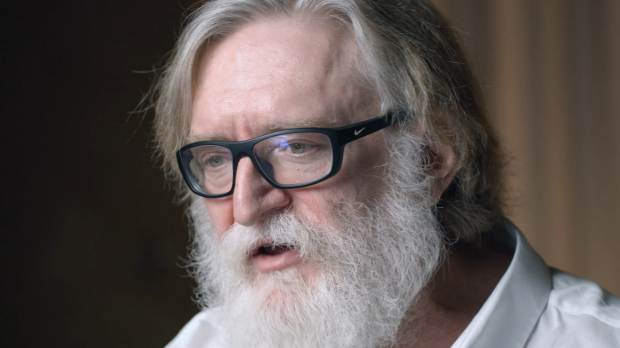Like most gamers, Valve's Gabe Newell also believes video games should emphasize fun over realism.

Half-Life just celebrated its 25th anniversary and Valve went all out for the momentous occasion with a feature-length Half-Life documentary and even making the old-school PC classic free to own for a limited time on Steam. The official Half-Life 25th anniversary documentary is filled with lore, history, and tidbits of the earliest days of Valve and of the sci-fi FPS itself.
The doc follows a lot of people who have worked at Valve, including small interviews with Valve founder Gabe Newell. These interviews are always a treat because of Newell's frank candor, and this documentary was no exception. Throughout the doc, Newell expressed his thoughts on fun vs realism, which is particularly interesting given Valve's high-precision VR physics system used in Half-Life Alyx.
"We'd have these conversations sitting in a design review, where somebody says 'That's not realistic.' And then you're like, 'Okay, what does that have to do...explain to me why that's interesting, because in the real-world I have to [do mundane things] like write up grocery lists.
"I've never thought to myself 'realism is fun.' I go to play games to have fun. And so we had to come up with some notion of what fun was.
"We knew it was an ad-hoc definition and it was the degrees to which the game recognizes and responded to the players choices and actions. In behavioral science, you would say we were explicitly talking about what were reinforcers and what the reinforcement schedules were.
"At that point in time, that was a useful way of making design decisions."
Newell goes on to say that reactivity was an incredibly important part of Half-Life's core "fun" component, and rightly so considering the game was all too ready to dish out total chaos should you miss a grenade throw, place a tripmine in the wrong spot, or try to muscle your way through groups of enemies.
"The point I would make is, if I go up to a wall and shoot it, to me, it feels like the wall is ignoring me. I'm getting a narcissistic injury when the world is ignoring me.
"[With Half-Life] I was trying to convey a sense to the user that, yes, you were making choices and progressing, which meant the game had to acknowledge that back to you. If you shoot at a wall, there has to be decals. If you kill a bunch of marines, the marines have to run away from you.
"You have to have this sense that the game is acknowledging and reacting to the choices and actions and progression that you've made. Otherwise it loses any sort of impact."




